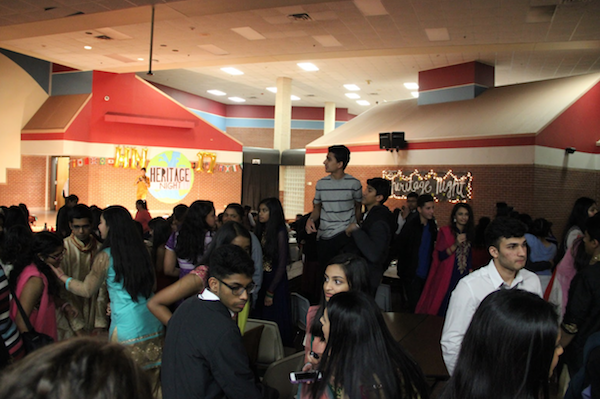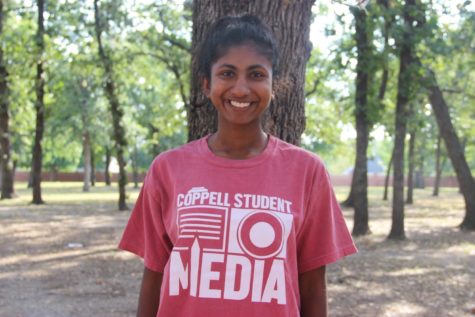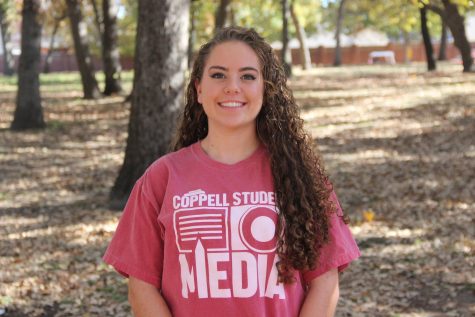Unique array of clubs contribute to culture, student body, interests at Coppell High School

Heritage Night is an annual event that is put on by the Junior World Affairs Club of Coppell High School. This year’s event took place March 3 and attracted more than 300 people.
April 6, 2017
With more than 90 organizations fostering a sense of belonging and catering to the diverse interests of Coppell High School’s student body, clubs are an integral part of finding one’s identity.
From an educational aspect, clubs allow students to apply skills learned in a classroom setting to real life situations, developing their communication ability, work ethic and organization skills.
But more importantly, clubs foster passions and interests outside adding to the high school experience.
“It gives you an opportunity to collaborate and work with individuals that are like-minded, like yourself,” CHS assistant principal and club coordinator Jamila Thomas said. “When you look at the clubs that we have here on campus, they are so diverse and no one discriminates in their membership. If it’s something you’re interested in or you want to try, pretty much all the clubs welcome those students into their organization.”
It is particularly prideful for sponsors when student display their capabilities to lead projects and plan activities without help from an adult.
“[Student leaders] organize how the meetings go, decide what activities we are going to do, one person will volunteer to lead the lesson,” Fellowship of Christian Athletes sponsor Clint Rushing said. “The kids pretty much run everything by themselves, my job is just an administrative role.”
Traditionally during their junior or senior year, some members can rise up to lead as an officer, responsible for decisions about the future of the organization and members.
The process for creating a club at CHS starts with a student securing a teacher sponsor, then filling out an application detailing fundraising plans, group size, meeting times and lastly when the application is reviewed by Thomas, the club will be approved or rejected.
All clubs are separate entities from the school that are independently operated and self-sufficient by membership dues and fundraisers.
Year after year, CHS sees transitions and fluctuations in the number and types of clubs that serve the student body. While some, such as National Honor Society and Business Professional of America, are longstanding and successful, some dissolve quickly.
An underlying problem that is most commonly faced by service clubs is inactivity due to the amount of work outside of school necessary for planning activities, securing sponsors and organizing events.
Planning charity benefit events takes much effort, paperwork and planning, a difficult task without motivation and genuine passion for bringing an idea to fruition.
“A lot of times with your service clubs, the intentions are there but when it comes to service clubs there’s a lot of work, a lot of planning, a lot of people you have to talk to because you are trying to do a service to the community,” Thomas said.
As a club slips into inactivity, members are not productive and do not follow through with the initial mission of the club. The lack of benefits for continuing a club will cause it to eventually dissolve. For the CHS Red Cross club, this was the case.
“Sometimes, students don’t realize how much work goes into actually maintaining and running an efficient club,” Thomas said. “So a lot of times when they are filling out the application, it’s easy to put ideas on paper but when you actually start implementing all those ideas, you realize that it’s not as easy.”
Similarly for the Model United Nations club on campus, without a sponsor two years ago, it became inactive and dissolved.
However, senior Joanne Jung, current MUN president, revived the club this year by gathering a group of passionate individuals to keep it alive.
“When I started Model UN during freshman year, it was one of my favorite things to do, it was relatively a very fun club,” Jung said. “We would go to conferences and meet new people who were very culturally aware, which was very cool, and I thought that it would be a great opportunity for the kids this year as well.”
Competition clubs provide students the opportunity to distinguish themselves from peers by gaining state, national or even international recognition for their work.
“We believe there is a place for everyone here at CHS, sometimes it’s a little hard to find because we are so big, but if you’ll help us find that place for you, in this case, find the right club or if you decide to start your own club because you are passionate about something, then that can be another way that CHS can be your home,” CHS Principal Mike Jasso said.
Recently, competition clubs, such as DECA, have been highly successful with 44 out of the 48 competitors advancing to the state competition this February.
“[DECA] helped me decide what I want to do in the future, which is marketing. I was able to experience all the ranges and types of marketing during the competition,” junior DECA member Sana Lalani said. “Importantly, you get to meet people and network in the business world.”
While club involvement can aid college resumes and foster interest, sometimes, membership comes with a substantial price tag. With no established program by the school to help students that cannot afford club membership fees or dues, money can sometimes become a limitation.
The CHS chapter of HOSA (Health Occupations Students of America) charges a $50 fee for students to be members, similar to the $60 fee of BPA (Business Professionals of America).
In addition, students that advance to state or regional competitions, are responsible for transportation, hotel and food costs.
Depending on the structure of the club, some have fundraising programs in place such as in DECA. Members sell $20 worth of popcorn to help with the club’s overall costs but all clubs are also limited by the CHS administration to two fundraisers a year.
For the Junior World Affairs Council, members put on Coppell High School’s fifth annual Heritage Night on March 3; this event was the largest of all Heritage Nights at CHS thus far.
With more than 300 people in attendance, a team of officers held auditions for performers, catered food and drinks, fundraised for the event and transformed the commons with decor for the night.
By allowing students to express their pride and love their culture through music and dance, the inclusive night showcased the melting pot that CHS and the nation are today.
Although dominated by Bollywood beats and the Indian student body, students gained an appreciation for other cultures with Korean pop, freestyle hip hop and classical Indian dance performances.
Religion can also bind people together and, in the case of athletes, to play for a greater calling or cause.
According to Rushing, in a culture that focused on putting yourself first before others, FCA emphasizes the importance of guiding underclassmen, being a team player and role model for others.
The club fosters growth in their faith, learning about Jesus, sharing bits of their life and allows younger kids hear the stories older kids of older kids, establishing role models.
“What we try to show through FCA is that you play for more than just yourself, you play to glorify God and the gifts and talents he has given you,” Rushing said.
As the ideals instilled through faith and accountability are important to individual growth, fused together with team sports, they are even more powerful.
“If you have a foundation of faith, regardless of what it is, you realize that you are not just playing for you it helps you buy into the team concept and put other things ahead of yourself,” Rushing said.
The survival of clubs through graduating classes can be difficult but, traditionally, larger clubs tend to have staying power if they are connected to the campus and pose benefits to the students involved, such as National Honor Society or Student Council.
The focus of the club must also appeal to a variety of students, passionate and willing to continue the club on campus.
Regardless of the focus of the club, clubs continue to be essential to the student culture and high school experience.
“When the seniors graduate, that passion that doesn’t graduate and walk out the door as well, there are others who feel passionate about that [same club],” Jasso said. “The important thing about clubs on any campus is that they are here to personalize or feed your passion beyond going through your regular course load and feed what it is what you love to do.”










